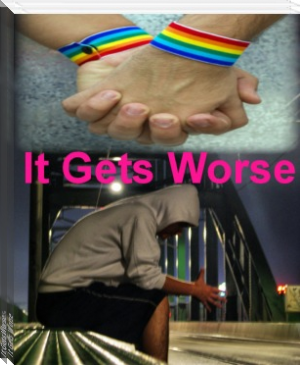The Walrus Hunters, Robert Michael Ballantyne [new reading .TXT] 📗

- Author: Robert Michael Ballantyne
Book online «The Walrus Hunters, Robert Michael Ballantyne [new reading .TXT] 📗». Author Robert Michael Ballantyne
Setting off again, they now made straight for the land discovered by Nazinred, which now lay like a dark blue line of hills in the far distance. From the abrupt termination of the land at either extremity of the range it was judged to be a large island.
As the night was clear and the ice level, the party travelled all that night, and arrived at the island about daybreak the following morning.
The shore was rocky and desolate, with high cliffs behind it, so that further progress to the eastward was evidently impossible, unless by passing round the island to the north or south of it.
"I said you would come to _something_," said the magician, sententiously, as they drew near to the forbidding coast.
"You were right, Aglootook. Indeed, it would be impossible for you to be wrong," replied Cheenbuk, with one of those glances at Anteek which rendered it hard for the boy to preserve his gravity; yet he was constrained to make the effort, for the magician was very sensitive on the point, and suspected the boy.
They were by this time running between the headlands of a small bay, and suddenly came in sight of an object which caused them all to exclaim with surprise and excitement--for there, under the shelter of a high cliff, lay a three-masted ship, or, as the Indian termed it, the white man's big canoe.
CHAPTER TWENTY SEVEN.
INTERESTING, AMUSING, AND ASTOUNDING DISCOVERIES.
Although close under the cliffs, and apparently on the rocks, the vessel was by no means a wreck, neither had it the aspect of one. There were no broken masts or tattered sails or ropes dangling from the yards. On the contrary, the masts were straight and sound; such of the yards as had not been lowered were squared, and all the ropes were trim and taut.
The deck was covered over with a roof of canvas, and the snow banked up all round so as to meet the lower edges of it and form a protection from the wind. Up one side of this bank of snow a flight of stairs had been cut, leading to the port gangway, and the prints of many feet were seen all round the ship converging towards the stairs, the steps of which were worn as if by much use.
At first the natives approached the vessel with extreme caution, not being sure of what might be their reception if any man should be on board, and with a sense of awe at beholding a mysterious object which had hitherto been utterly beyond the range of their experience, though not quite unknown to them by report. By degrees, however, they drew nearer and nearer, until they reached the bottom of the snow staircase. Still there was no sound to be heard in the white man's big canoe to indicate the presence of a human being.
At last Cheenbuk uttered a shout with the view of attracting attention, but there was no reply.
"Make the fire-spouter speak," he said, looking at his Indian friend.
Nazinred silently obeyed, pointed his gun at the clouds, and fired; then the whole party awaited the result, listening intently. They heard much more than had been expected, for the cliffs embraced several echoes, which, being thus rudely awakened, sent the shot crashing back with multiplied violence, to the no little surprise, as well as alarm, of the hearers.
Still all was silent on board of the ship, and at last, coming to the conclusion that there was no living soul there at all, the Indian, having reloaded his gun, began to ascend the staircase, closely followed by Cheenbuk, Oolalik, Anteek, and Aglootook--which last, being a cautious man, was careful to bring up the rear. Nootka and Cowlik remained on the ice to observe the end of it all--the former anxiously curious, the latter curiously easy. For some time these two stood in silent expectancy. Then Oolalik appeared at the top of the staircase, and, looking down with a face in which solemn wonder had reached its utmost limit of expression, beckoned them to come up.
Nootka obeyed with alacrity; her companion, leisurely.
What the party saw on entering the vessel was well fitted to arouse wonder in their unsophisticated minds. Whether it was one of the numerous discovery ships that have invaded those regions in the present century, or a whaler which had been driven out of its course by stress of weather or power of ice, is uncertain, for although some relics of the expedition ultimately reached the outpost of the fur-traders, nothing was brought away by the Eskimos which bore name or date or writing of any kind. Although ignorant of the meaning as well as the uses of almost everything they saw, those natives were quite sufficiently intelligent to guess that the white man's big canoe had been set fast in the ice the previous autumn, and laid up for the winter in this place of safety to serve as a big igloe or hut.
Their examination of the ship was at first very slow, for they stepped about on tiptoe as if afraid of disturbing some of the ghosts of its former inhabitants. Then, a speculative gaze had to be turned on each object for a few moments, followed by an inquiring glance at each other. The deck and its accompaniments of masts rising through the canvas roof, and ropes, and blocks, hatches, skylights, companions, etcetera, afforded them matter for unbounded astonishment; though what they afterwards discovered below was productive of unutterable amazement.
"Hoi!" exclaimed Cheenbuk, pointing at something with all his ten fingers expanded.
He had discovered the binnacle, and was gazing for the first time at the mariner's compass!
"Hi!" cried the responsive Anteek in a wide-eyed condition.
He had discovered the after-companion, which was partially open, and was gazing solemnly into the depths below.
The unwonted nature of their surroundings developed an unsuspected vein of curiosity in Cowlik, who pushed the companion-door open, and, seeing a flight of steps with some degree of light below, she began to descend. Whether Nootka's surprise at this sudden act of self-assertion, or her curiosity, was the stronger, it would be hard to say, but she immediately went after Cowlik. The men, seeing the way thus indicated, did not hesitate to follow.
Of course they all held tenaciously by the brass rail, being afraid to slip on the steep stair, and some of them, slewing round almost naturally, went down in true sailor fashion, backwards.
Reaching the bottom, the girls, probably by chance, turned to the left and entered the after-cabin. The men of the party turned to the right, and became absorbed in contemplation of the steward's pantry. It smelt deliciously, but that was all that remained of its native attractions, for of food or drink there was nothing left.
They had just made this discovery when a loud laugh and then a wild scream from the cabin horrified them. Cheenbuk and Oolalik drew their knives, Nazinred cocked his gun, Anteek grasped a rolling-pin that lay handy, and all four sprang to the rescue.
The scream came from Cowlik. She had suddenly faced a mirror that hung in the cabin, and beheld a perfect representation of her own fat face. It was by no means an unknown face, for she had often had an imperfect view of it in pools and in calm seas, but it quite took her aback when thus unexpectedly and clearly presented. The blaze of astonishment that followed the first glance caused the burst of laughter referred to, and the display of her wide mouth and white teeth in the changed expression induced the scream of alarm. It also made her start backward so quickly that she sent poor Nootka crashing against the starboard bulkhead.
"Look!" cried the frightened girls, pointing to the mirror.
The three Eskimos sprang forward and received something like an electric shock on beholding their own faces.
Cheenbuk turned to Nazinred, but that usually grave Indian was indulging in a patronising smile instead of sharing their surprise.
"I know what it is," he said quietly. "I have seen it before, in the stores of the fur-traders, but never so big as that."
Familiarity, it is said, breeds contempt. After gazing at themselves in the miraculous mirror for some time, an idea occurred to Anteek. He suddenly shot out his tongue, which happened to be a very long one. Anteek's reflection did the same. Thereupon Oolalik opened his mouth wide and laughed. So did Oolalik's reflection, which had such an effect upon Cheenbuk that he also burst into a fit of laughter. The girls, pressing forward to see what it was, likewise presented grinning faces, which formed such a contrast to the grave countenance of Nazinred, as he stood there in all the dignity of superior knowledge, that the whole party went off into uncontrollable explosions, which fed upon what they created until the tears were running down the cheeks of the Eskimos, and the Indian himself was constrained at last to smile benignly.
But mirth gave place to solemnity again, not unmingled with pity, as they spent hour after hour examining the various parts of the forsaken ship. Of course they could go over only a small part of it that day. When the short day came to a close they went to the shore and encamped in their usual way--not daring to sleep on board a big canoe, about which as yet they knew so little.
On shore they found more subjects of interest and perplexity, for here were several mounds marked by crosses, and a large mound surmounted by a pole on the top of which were fluttering a few remnants of red cloth. The shape of the smaller mounds naturally led them to infer that they were the graves of white men who had died there, but the large mound was inexplicable until Nazinred recollected having seen a flag hoisted on a pole at the fort on Great Bear Lake.
"I remember," he said to Cheenbuk, "that the traders used to hoist a piece of cloth to the top of a pole like this, at times, when something of importance happened. Perhaps the chief of the big canoe died and was buried here, and they hoisted the red cloth over him to mark the place."
"My father may be right," observed the Eskimo; "but why did they put such a heap of stones above him?"
"Perhaps to keep the bears from getting at him," returned the Indian thoughtfully, "or, it may be, to show him great respect."
Resting satisfied with these surmises, the two men returned to their encampment without disturbing the mound, which was, in all probability, a cairn covering a record of the expedition which had come to such an untimely end.
Next day, the moment there was enough of light to enable them to resume the search, the Eskimos hurried on board the ship and began to ransack every hole and corner, and they found much that caused their eyes to glitter with the delight of men who have unexpectedly discovered a mine of gold. Among other things, they found in a small room which had been used as a blacksmith's forge, large quantities of hoop, bar, and rod-iron. While Cheenbuk and Oolalik were rejoicing over this find, Anteek rushed in upon them in a state of considerable excitement with something in his hand.





Comments (0)